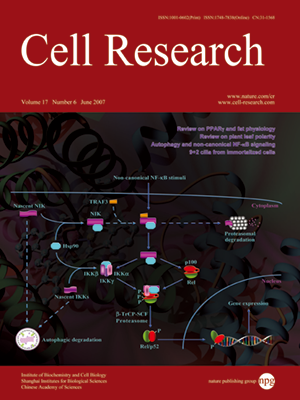Volume 17 Issue 6, June 2007: 565-571
ORIGINAL ARTICLES
Parthenolide protects human lens epithelial cells from oxidative stress-induced apoptosis via inhibition of activation of caspase-3 and caspase-9
Hangping Yao1, Xiajing Tang2, Xueting Shao1, Lei Feng1, Nanping Wu1, Ke Yao2
1National Key Laboratory of Infectious Diseases, Institute of Infectious Diseases, First Affiliated Hospital, School of Medicine,
Zhejiang University, Hangzhou, China; 2Eye Center, Second Affiliated Hospital, School of Medicine, Zhejiang University, 88 Jiefang
Road, Hangzhou 310009, China
Correspondence: Ke Yao(xlren@zju.edu.cn )
The apoptosis of lens epithelial cells has been proposed as the common basis of cataract formation, with oxidative stress
as the major cause. This study was performed to investigate the protective effect of the herbal constituent parthenolide
against oxidative stress-induced apoptosis of human lens epithelial (HLE) cells and the possible molecular mechanisms
involved. HLE cells (SRA01-04) were incubated with 50 μM H
2O
2 in the absence or presence of different doses of
parthenolide (10, 20 and 50 μM). To study apoptosis, the cells were assessed by morphologic examination and Annexin
V-propidium iodide double staining flow cytometry; to investigate the underlying molecular mechanisms, the expression
of caspase-3 and caspase-9 were assayed by Western blot and quantitative RT-PCR, and the activities of caspase-3 and
caspase-9 were measured by a Chemicon caspase colorimetric activity assay kit. Stimulated with H
2O
2 for 18 h, a high
fraction of HLE cells underwent apoptosis, while in the presence of parthenolide of different concentrations, dose-dependent
blocking of HLE cell apoptosis was observed. The expression of caspase-3 and caspase-9 induced by H
2O
2 in HLE
cells was significantly reduced by parthenolide both at the protein and mRNA levels, and the activation of caspase-3 and
caspase-9 was also suppressed by parthenolide in a dose-dependent manner. In conclusion, parthenolide prevents HLE
cells from oxidative stress-induced apoptosis through inhibition of the activation of caspase-3 and caspase-9, suggesting
a potential protective effect against cataract formation.
Cell Research (2007) 17:565-571 doi: 10.1038/cr.2007.6; published online 6 March 2007
FULL TEXT | PDF
Browse 1831


